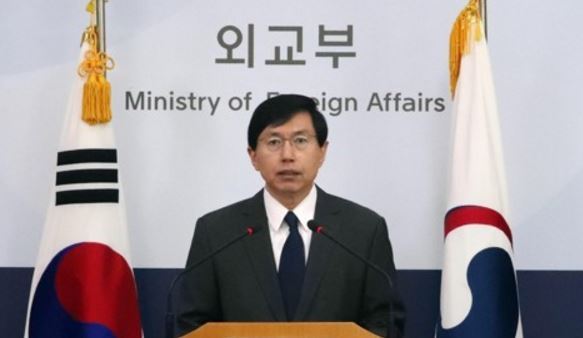South Korea on Thursday hailed US President Donald Trump's ratification of a bill that imposes sanctions on Russia, China and North Korea, voicing hopes that it could quicken North Korea's denuclearization.
"The latest law adopts a vast range of new sanction elements and significantly intensifies the implementation of existing sanctions on North Korea," Cho June-hyuck, spokesman at the Ministry of Foreign Affairs, said in a press briefing.

"(The new law) reflects the United States' strong determination for North Korean denuclearization. We expect that such efforts could curb the sophistication of North Korea's nuclear and missile programs, and result in its genuine attitude change."
On Wednesday in Washington, D.C., Trump signed the Countering America's Adversaries Through Sanctions Act into law, with a North Korean segment aimed at shutting down the flow of crude oil and other oil products into North Korea. It also put limits on North Korea's trade of goods and labor forces.
Asked whether the new law would make the now-suspended inter-Korean Kaesong Industrial Complex that employs North Korean workers illegal, Cho said, "The US Congress has given that authority to the administration in the bill."
South Korea shut down the joint industrial park in February 2016 in response to North Korea's fourth nuclear test and launch of a long-range rocket early last year.
The US law sanctioned foreign persons employing North Korean labor, spawning concerns that it may deal a blow to the factory zone if Seoul seeks to resume it.
"The sanctions do not appear to be applied to the Kaesong complex as they target foreign firms employing labor exported by the North," said an official at Seoul's unification ministry.
Opened in 2004 in North Korea's border city of Kaesong, the factory zone had housed 124 South Korean firms hiring more than
54,000 North Korean workers to produce labor-intensive goods, such as clothes and utensils.
Liberal President Moon Jae-in earlier said that the resumption of the factory zone would depend on the progress of North Korea's denuclearization.
The government under ousted President Park Geun-hye closed it, saying that money generated from there is suspected of bankrolling North Korea's nuclear and missile programs. But Moon's government said that there is no clear evidence to support the view. (Yonhap)








![[Graphic News] More Koreans say they plan long-distance trips this year](http://res.heraldm.com/phpwas/restmb_idxmake.php?idx=644&simg=/content/image/2024/04/17/20240417050828_0.gif&u=)
![[KH Explains] Hyundai's full hybrid edge to pay off amid slow transition to pure EVs](http://res.heraldm.com/phpwas/restmb_idxmake.php?idx=644&simg=/content/image/2024/04/18/20240418050645_0.jpg&u=20240419100350)





![[From the Scene] Monks, Buddhists hail return of remains of Buddhas](http://res.heraldm.com/phpwas/restmb_idxmake.php?idx=652&simg=/content/image/2024/04/19/20240419050617_0.jpg&u=20240419175937)

![[KH Explains] Hyundai's full hybrid edge to pay off amid slow transition to pure EVs](http://res.heraldm.com/phpwas/restmb_idxmake.php?idx=652&simg=/content/image/2024/04/18/20240418050645_0.jpg&u=20240419100350)

![[Today’s K-pop] Illit drops debut single remix](http://res.heraldm.com/phpwas/restmb_idxmake.php?idx=642&simg=/content/image/2024/04/19/20240419050612_0.jpg&u=)